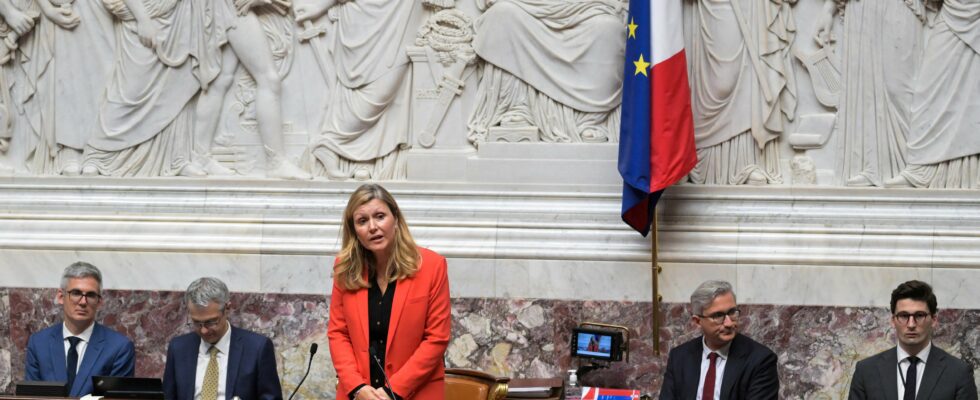8:30 p.m., Thursday, July 18. National Rally MP José Gonzales, dean of the lower house and as such, president of the inaugural session, announces Yaël Braun-Pivet’s victory in the Perchoir. On the benches of the hemicycle, relief for the outgoing president, who passed by 13 votes, not to be re-elected to this position that she had enjoyed so much these last two years. But as on the evening of the dissolution, some already see themselves ousting her from the seat on which she sits.
“She won a vote, but it is not in the spirit of democracy,” scolds environmentalist Sandrine Rousseau on TF1, announcing: “We [NDLR : le Nouveau Front populaire] will look at possible legal recourses” against this election. At the same time, the National Front MP Jean-Philippe Tanguy answered questions from Franceinfo. And concedes: “It is true that without the votes of the ministers, Mrs Braun-Pivet would not have been elected.”
A flexible reading of the Constitution
Disapproval, so to speak, transpartisan, and fueled by the legal vagueness surrounding the vote of the 17 ministers elected as deputies on July 7th. “Minister-deputies”, a formula with an air of oxymorons. And for good reason, the letter of article 23 of the Constitution of 1958 prohibits a member of the government from being at the same time a deputy or senator: “The functions of member of the Government are incompatible with the exercise of any parliamentary mandate […]”. The opposition to the presidential camp is relying on this principle to denounce the participation of ministers in the election of the president of the National Assembly, and therefore, to contest the legality of the election of Yaël Braun-Pivet. In reasoning in this way, the opposition to the former presidential majority is, however, ignoring two precedents.
The first dates back to 1967, when the absolute majority was greatly weakened. The second, from 1988, when the socialists had only managed to elect 275 deputies and had to deal with a relative majority. In both cases, the ministers elected in their constituency were able to vote for the candidate of the Elysée, thus guaranteeing his election. This, for a simple reason, explains the constitutionalist Guillaume Drago: “The electoral code gives a period of one month before the substitute replaces a deputy appointed to the government”. The practice is therefore based on the principle that the converse is the same for a minister elected as a deputy. “The substitutes cannot therefore take the place of resigning ministers who have expressed their wish to sit in the hemicycle”, he explains.
No protest body
In addition, constitutionalist Anne Levade points out that in 1967 and 1988, ministers elected as deputies were members of a “current affairs” government. A formula from the legal-institutional nomenclature which means that the head of government had previously submitted his resignation to the tenant of the Elysée, and that the latter had accepted it. However, this is exactly the situation in which Gabriel Attal’s government has found itself since Tuesday, July 17. After having refused it for the first time the day after the second round of the legislative elections, Emmanuel Macron has effectively accepted the resignation of his prime minister.
“Since a decree terminating the government’s functions was signed by the President of the Republic before the vote, and since the practice has already occurred, there is no reason for ministers not to vote on the day of the election of the president of the lower house,” argues Anne Levade, professor of public law at the University of Paris 1 Panthéon-Sorbonne and president of the Paris 1 Panthéon-Sorbonne Foundation. Especially since the practice has never been contested, she adds.
For one reason perhaps: at the time there was no structure before which to contest it. And the situation does not seem to have changed. “There can be no litigation, simply because there is no judge for that: we cannot refer the matter to the Constitutional Council, because it has declared itself incompetent on two occasions, notably in 1986”, dissects Jean-Jacques Urvoas, constitutionalist, former Minister of Justice (2016-2017) and socialist MP (2007-2016). The hopes of the NFP and the RN to call a new election at the Perchoir are slim. Finally, smiles a parliamentary bigwig, “until the next dissolution”…
